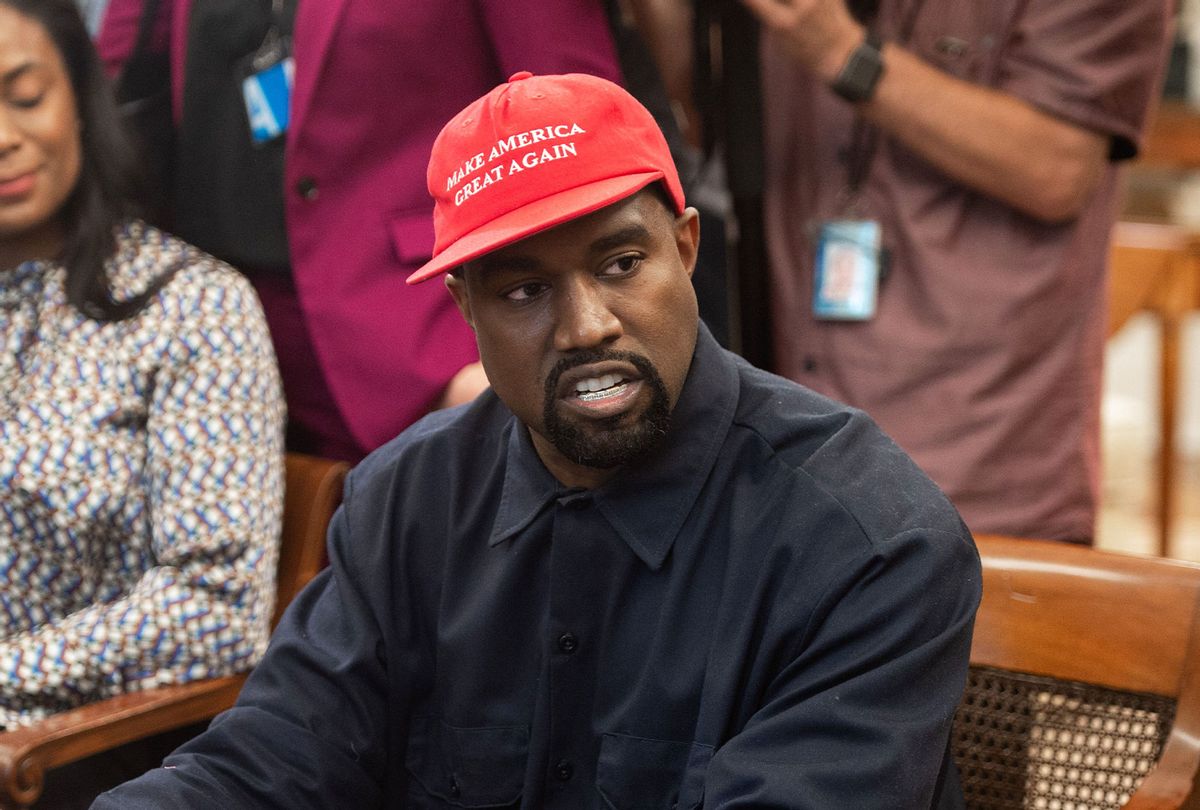Kanye West, regurgitating a false drug war trope, blames George Floyd’s death on fentanyl

The artist formerly known as Kanye West has stirred controversy for claiming George Floyd died from a fentanyl overdose — not the fact that Officer Derek Chauvin kneeled on his neck for more than nine minutes while Floyd was handcuffed face-down on the asphalt.
West, who legally changed his name to Ye last year, appeared on the Drink Champs podcast on Sunday, where he claimed “They hit him [Floyd] with the fentanyl. If you look, the guy’s knee wasn’t even on his neck like that.” Fentanyl is an illicit opioid that has dramatically driven drug overdose deaths in the last decade. The episode has since been taken down, with the podcast hosts describing Ye’s comments as “false and hurtful.”
Ye has furthered a popular trope used by law enforcement: That drug use is an acceptable justification for killing someone.
Ye cited “The Greatest Lie Ever Sold: George Floyd and the Rise of BLM,” the recent Daily Wire documentary written by Candace Owens, as evidence for Floyd’s cause of death. This postulate has surrounded Floyd’s murder since the beginning, but has been debunked by the Hennepin County medical examiner’s office, which ruled in June 2020 that Floyd’s death was a homicide caused by “cardiopulmonary arrest while being restrained by law enforcement officer.”
In the same report, Floyd’s use of illicit drugs (fentanyl and methamphetamine), as well as his history of heart disease, are listed as “other significant conditions,” but this does not undermine their conclusion that the manner of death was murder. A second autopsy report came to the same conclusion.
But in repeating this overdose myth, Ye has furthered a popular trope used by law enforcement: That drug use is an acceptable justification for killing someone. In fact, Chauvin’s defense leaned heavily on the idea that drugs killed Floyd, not the officer. It didn’t work. A jury convicted Chauvin of two counts of murder and one count of manslaughter.
Want more health and science stories in your inbox? Subscribe to Salon’s weekly newsletter The Vulgar Scientist.
In her book “Undoing Drugs,” author and drug war historian Maia Szalavitz notes that Officer Tou Thao, who stood by while Chauvin murdered Floyd, told bystanders, “This is why you don’t do drugs, kids.”
“Let that remark in those circumstances sink in for a minute,” Szalavitz wrote. “Without invoking explicit racism, Thao was attempting to rationalize Chauvin’s life-threatening violence, framing it as ‘anti-drug’ and therefore acceptable.”
“Implicit in this statement and others related to Floyd’s history of illegal drug use is the idea that it disqualifies him as a person—and that, as someone who took drugs, he deserved maltreatment, even death,” Szalavitz added.
This sort of conflation — drugs were involved, so lethal police violence was necessary — goes back at least a century. In 1914, The New York Times warned that “Negro cocaine fiends” were terrifying the American South, with the stimulant turning Black men into “peculiarly dangerous criminal[s]” that couldn’t be stopped even by multiple gunshots.
Dr. Carl Hart, an associate professor of psychology at Columbia University, rightly dismissed cocaine-powered
Hart described how this “tired gimmick” of drudging up a victim’s drug history was also used in the deaths Trayvon Martin, Terence Crutcher, Michael Brown, Laquan McDonald and many others.
superhuman strength as “preposterous,” but noted in The Nation that such superstitions have become a cornerstone of U.S. drug policy. “In some cases, suspicion of cocaine intoxication by blacks was reason enough to justify lynchings. Eventually, it helped influence legislation,” Hart wrote.
It’s not just cocaine or fentanyl, either. Meth, heroin, cannabis and PCP or “angel dust” have all been invoked as justifications when cops kill folks, especially people of color. To cite one example, Philando Castile was fatally shot by Officer Jeronimo Yanez during a traffic stop in 2016. Yanez used marijuana found in Castile’s vehicle as a justification for lethal self-defense, stating in an interview he feared for his life because Castile had the “audacity” to use cannabis in front of the other passengers in his car, including a five-year-old girl. Yanez was acquitted by a jury.
Writing in the journal Neuron in 2020, Hart described how this “tired gimmick” of drudging up a victim’s drug history was also used in the deaths Trayvon Martin, Terence Crutcher, Michael Brown, Laquan McDonald and many others.
“In each of these cases, the deceased’s toxicology findings, combined with his behavior, revealed drug levels that I believe were too low to have contributed to his death,” Hart wrote. “Drugs didn’t make them act so violently that lethal force was reasonable or necessary; nor did they cause some fatal medical condition. But it didn’t matter. By introducing drug use as a potential contributing factor, it creates a smokescreen for juries to find, almost always, white-identifying police and wannabes not guilty in the killing of Black people.”
There is no scientific evidence that drug use — any drug use — can cause changes in the brain that would cause violence justifying murder. Blaming Floyd’s death on his health and drug use is equally as dismissive and not backed by evidence.
“In the United States, where tacit racism is pervasive, it is unsurprising—and infuriating—that the fear of drugs, abetted by arguments poorly grounded in scientific evidence, is used to legitimize the massacre of Black people,” Hart writes.
This attitude fits into other prominent drug war myths, such as that fentanyl is so deadly it can kill with mere skin contact (it definitely cannot) or that diabolical drug dealers are lacing Halloween candy with “rainbow” fentanyl (also not happening). Nonetheless, these myths persist.
Perhaps there’s a more cynical motivation for Ye’s comments. He recently agreed to purchase Parler, the struggling right wing social media platform, which is owned by Candace Owens’ husband, George Farmer. It may be a result of his ongoing relationship with Owens: the two of him were recently pictured together wearing “White Lives Matter” t-shirts. It gets more confusing considering Ye has donated huge sums of money to the Floyd family.
Nonetheless, George Floyd’s family is allegedly considering a lawsuit against Ye, according to Lee Merritt, a civil rights attorney who has represented the Floyd family.
“While one cannot defame the dead,” Merritt tweeted Sunday. “Claiming Floyd died from fentanyl not the brutality established criminally and civilly undermines & diminishes the Floyd family’s fight.”
Update Oct. 18th 5:00 EST: The mother of George Floyd’s daughter has officially filed a $250 million lawsuit against Ye, according to Click 2 Houston.
Read more
about the drug war


